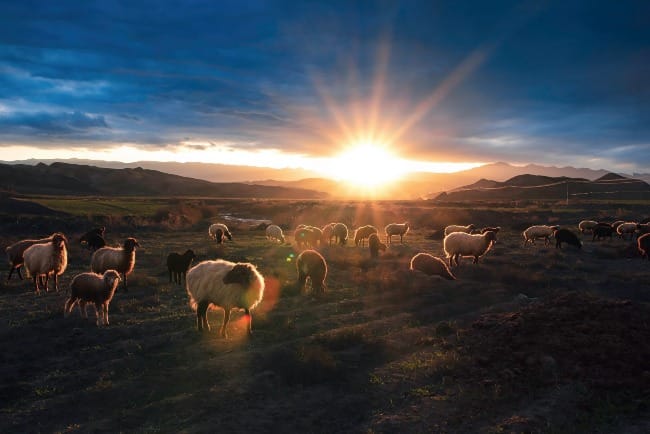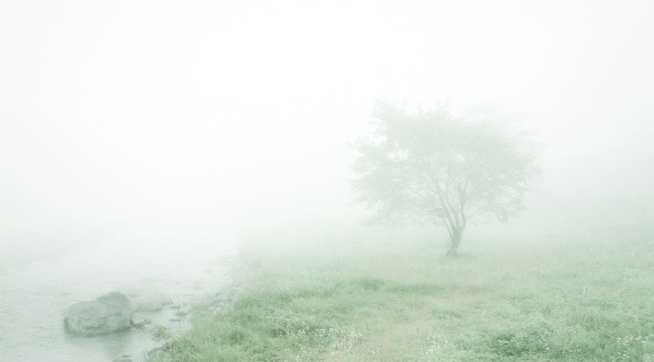Here is the third installment of our Exodus series - it is a little longer than my typical column. If you want to take a few minutes to read Exodus 3-4, click HERE. And if you missed the last column in this series, click HERE. Once again, we will walk though the text and highlight aspects that are not typically noticed, and then conclude with a few themes for ecological discipleship. Thoughts and comments are welcome. - James.
__________________________
Call...

As Chapter 3 begins, Moses is living his new life in Midian, married, caring for his father-in-law's flock of sheep, and safely out of the reach of Pharaoh. He is not, however, safely out of the reach of God. When the king of Egypt dies, God is not only full of compassion for the enslaved Israelites but ready to act.
We meet Moses as he is out tending to his father's flock of sheep. I cannot help but wonder how these years of caring for sheep helped prepare Moses for the hard task that is to come. There is something about caring for other creatures that requires deep empathy, practical skills, creative problem solving, and situational discernment.
Moses takes his flock to the far side of the wilderness - most likely a seasonal grazing area. He is far away from civilization, fully immersed in a wild place. This setting is crucial to what happens next, for in the wilderness Moses is alone, vulnerable, and free from distraction. He is, I imagine, hyper attentive to the land, paying attention to the sources of protection, provision, and danger. He is primed for the encounter that comes, and I wonder what might happen today if more of us sought out such places with open minds and hearts.
When he comes to "Horeb, the mountain of God," Moses sees a bush on fire that is not consumed. It piques his curiosity, and as he moves toward it, he hears his name called out twice from within the flames. It is a moment when God's presence is clearly mediated in and through the material world. Those formed by the Celtic tradition often call such places "thin," because the veil between heaven and earth is lifted and we experience, if only for a moment, the essential oneness of creation and the glory of the Creator. Can you remember a transcendent moment of awe and wonder like this?
As Moses comes closer, God asks him to remove his sandals, for he is on "holy ground." Moses' response, "Here I am," is common in biblical "call" stories, and tells us that he is open to this encounter. God proceeds to tell Moses about hearing the suffering of the people and deciding to come down to rescue them and take them to a "good and spacious land." I imagine that Moses was ecstatic to hear this, until God revealed the details of the plan:
"So now, go. I am sending you to Pharaoh to bring my people the Israelites out of Egypt."
The familiarity of this story can dull its shocking nature. The all-powerful Creator decides to "come down" and fix something on Earth, yet decides to do so through human beings, who are the very creatures responsible for the mess. And in this case, choosing a human being who is surely on Egypt's "Most Wanted" posters. It is not surprising that Moses does not jump for joy at being chosen.

...and Response
Moses responds to this surprising call with a series of objections, each answered by God with various levels of patience and assurance.
Objection #1 - "Who am I that I should go to Pharaoh and bring the Israelites out of Egypt?" A reasonable question of identity and authority, which God does not answer directly in response: "I will be with you, and bring all of you back to this mountain to worship."
Objection #2 - It's great that you're going with me, but who are you? "What shall I tell them?" Another reasonable question of identity and authority, which God answers directly: "God said to Moses, 'I AM WHO I AM.'" This enigmatic name - in Hebrew it is "Yahweh" - is notoriously difficult to translate. It can also mean something like "I will be who I will be." It is a mysterious, inscrutable name, the name of the One who creates and sustains all things, who is both in and beyond time and space, who is Truth and Life and Being. God adds another name to the mix, this one rooted deep in the history of the people: "the God of your ancestors - the God of Abraham, Isaac, and Jacob." I find it fascinating that the names God gives to Moses bring creation and redemption together.
Objection #3 - "What if they do not believe me or listen to me?" Yet another reasonable question. This time, God answers through signs, turning Moses' staff into a snake, making his hand scaly and withered, then healing it, and promising to turn the Nile to blood if they still won't listen (spoiler alert: they won't). These signs are more than impressive tricks - they strike at key sources of identity and authority. Moses' staff was a symbol of his authority, while a snake appeared on Pharaoh's headdress as a symbol of divine protection and power. Skin diseases were considered a sign of arrogance before God (and so Moses' healing would legitimize his standing before God). The Nile was both the literal and symbolic location of Egypt's prosperity. These signs are directly connected to the power struggle that is coming.
Objection #4 - "I am slow of speech and tongue." God's response seems to indicate a little impatience: "Who gave human beings their mouths? Who makes them deaf or mute? Who gives them sight or makes them blind? Is it not I, the LORD? Now go; I will help you speak and will teach you what to say." It is interesting to me that this response, like God's names, points to creation in general as well as to this particular historical moment. I bring this up again because modern theology, biblical study, preaching, and discipleship tend to separate creation and redemption, which is a big reason why Christians have been slow to see the importance of caring for the earth, and how it is connected to God's purposes for humanity.
Objection #5 - This is not really an objection so much as a desperate plea to get out of a difficult assignment: "Pardon your servant Lord. Please send someone else." Now God's growing impatience turns to anger, but God does not reject Moses or release him. Instead, God accommodates Moses' concern and gives him Aaron as a sidekick. As they go off to Egypt, we'll pause to look at two themes from today's text that help us in our journey of ecological discipleship.

Re-wilding Faith
The power and potential of places that are not dominated by humans is especially important in our age. Modern, industrial humanity has been exceptionally good at domesticating almost anything it touches. To "civilize" something, or someone, has been an unquestioned good, and so "wild" places, people, and other creatures have been tamed or destroyed. This civilizing impulse has included religion and religious spaces - we have domesticated God by reducing theology to what serves modern humanity (when was the last time you heard a sermon on the purpose/future of creation?), by confining the divine presence to the built environment (such as churches and other "sacred spaces"), and by controlling access to divine presence or approval (think about how religious communities define who is in/out, saved/unsaved, etc.).
Moses lived in one of the most civilized societies of his time, yet it was also one of the most brutal - a paradox that, sadly, repeats itself through history. Leaving the civilized world opened Moses to new possibilities for himself and his place in the world, and to an encounter with the wild God of creation, who can never be civilized (just read the bewildering story of Exodus 4:24-26). When I ask people where they feel closest to God, almost everyone says "Nature." This makes sense because we are fundamentally part of nature, creatures among creatures. It is often the false ideologies of "civilization" that makes us less at home in the world.
We need to re-wild our faith, remembering that our relationship to God is connected to our relationship with our local land and waterways, and with the creatures that share our home. This is true whether we live in a condo in the city or a cabin in the mountains. Finding ways to connect with the wildness around us can also connect us to the wildness of God, who tends to show up in surprising ways in these places. This leads to a second theme..

Listening For a Vocation within The Great Vocation
Exodus 3-4 is rightly understood as Moses' call story. God calls him to a specific task, or vocation, and promises to be with him and provide the resources he needs to accomplish it. It is certainly unique; I do not know of anyone else called to such a task from a bush that was on fire, but not burning up. But it is also not unique at all; God calls each of us to partner in the work of healing the world. This, I believe is the "Great Vocation" that we all share - all of our particular vocations flow out of this common call. Some are lifetime vocations, like parenting and ordination. Others are for a specific task or season. All of them help us to become more human and, when done well, help the created world become more what the Creator intends it to be.
Most vocations do not come about through a dramatic divine encounter, but occasionally they do. It might happen more often if we were in the right place - literal and metaphorical - to hear it. Sometimes we may need to find some wild space in order to listen for the voice that calls us by name.
There were two key moments in the call to my current vocation - leading Circlewood - that helped me hear a new call. The first came at the Brooksdale Environmental Centre in Surrey, British Colombia. I spent three wonderful days with the great people of A Rocha Canada, working in the fields, walking in the woods, exploring the creek, and talking to people who shared my passion to connect faith and creation. On the third day, as I was looking out over the center and thinking about how much I was drawn to it, I "heard" something like, "You should do something like this." It wasn't audible, but it was clear. About a year later, when I was ready to say yes to this invitation but had no idea what that meant, I ended a time a prayer by asking God quite directly for a "burning bush" moment that would show me the way forward. Ten minutes later I received the following email from my spiritual director:
"Hey James...I received a request from folks with 40 acres on Camano Island that are wondering what to do with it. Sounds like they are exploring all options and would like to connect with you and hear about your potential ideas...are you interested in connecting with them?"
Like Moses, I had some objections, but I was unmistakably on holy ground. All I had to do was answer, "Here I am."
Closing Questions
Have you felt called to a particular vocation? How did you "hear" the call? What was your response? In what ways is God encouraging you to help heal the world? I'd love to hear your thoughts, either in a comment below or directly to me at james.amadon@circlewood.online.
With you on the Way,
James
Like what you are reading? Consider joining our supporter community, The Circlewood Stand. Just $10/month makes a huge difference, and makes you part of a growing group of people standing FOR the good of creation and standing WITH Circlewood as we make a difference together. Thanks for considering!